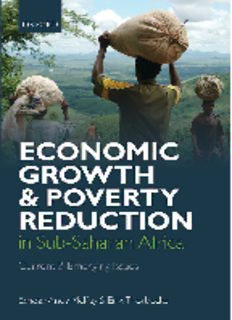
Economic Growth and Poverty Reduction in Sub-Saharan Africa : current and emerging issues PDF
Preview Economic Growth and Poverty Reduction in Sub-Saharan Africa : current and emerging issues
Economic Growth and Poverty Reduction in Sub-Saharan Africa Economic Growth and Poverty Reduction in Sub-Saharan Africa Current and Emerging Issues Editedby Andy McKay and Erik Thorbecke 1 3 GreatClarendonStreet,Oxford,OX26DP, UnitedKingdom OxfordUniversityPressisadepartmentoftheUniversityofOxford. ItfurtherstheUniversity’sobjectiveofexcellenceinresearch,scholarship, andeducationbypublishingworldwide.Oxfordisaregisteredtrademarkof OxfordUniversityPressintheUKandincertainothercountries ©OxfordUniversityPress2015 Themoralrightsoftheauthorshavebeenasserted FirstEditionpublishedin2015 Impression:1 Allrightsreserved.Nopartofthispublicationmaybereproduced,storedin aretrievalsystem,ortransmitted,inanyformorbyanymeans,withoutthe priorpermissioninwritingofOxfordUniversityPress,orasexpresslypermitted bylaw,bylicenceorundertermsagreedwiththeappropriatereprographics rightsorganization.Enquiriesconcerningreproductionoutsidethescopeofthe aboveshouldbesenttotheRightsDepartment,OxfordUniversityPress,atthe addressabove Youmustnotcirculatethisworkinanyotherform andyoumustimposethissameconditiononanyacquirer PublishedintheUnitedStatesofAmericabyOxfordUniversityPress 198MadisonAvenue,NewYork,NY10016,UnitedStatesofAmerica BritishLibraryCataloguinginPublicationData Dataavailable LibraryofCongressControlNumber:2015936891 ISBN 978–0–19–872845–0 Printedandboundby CPIGroup(UK)Ltd,Croydon,CR04YY LinkstothirdpartywebsitesareprovidedbyOxfordingoodfaithand forinformationonly.Oxforddisclaimsanyresponsibilityforthematerials containedinanythirdpartywebsitereferencedinthiswork. Foreword The African Economic Research Consortium (AERC) has just celebrated its twenty-fifth anniversary. At the time of its foundation, economic policy decisions in Africa were largely based on anecdotes, judgement, heuristics, andideology.TheAERCcameintoexistencetobringrigourandevidenceto economic policymaking in Africa through capacity building in the advance- ment of research and training. The anniversary celebration underscored the many accomplishments of the AERC as a true African success story. At the centre of the story is a collaborative research programme involving the col- laboration of senior AERC network researchers and thought leaders from aroundtheglobeonsubjectsofcontemporarypolicyinterestinAfrica. InthebestoftheAERC’straditions,thisvolumeisanoutcomeofacollab- orativeeffort.ItsfocusisoncurrentandemergingissuesonEconomicGrowth andPoverty Reduction in Sub-Saharan Africa. Thisvolumebuilds onthe earlier work done by AERC in the areas of growth and poverty, in particular, the Explaining African Growth volumes and the Poverty, Income Distribution and Labour Market Issues in Sub-Saharan Africa volume—key projects that have had significant impacts on policy design in the areas of growth and poverty reductioninAfrica. RecentstudiesbytheAERCandothershaveshownthatAfricaisgenuinely growing.Inthelasttwodecades,Africahasmovedfrombeingperceivedasa ‘failedcontinent’tobecomeoneofthefastest-growingregionsoftheworld. Africa’srecentgrowthhasexhibitedsignificantresilience,asevidencedduring the recent global financial and economic crises; and significant diversity, as witnessedinthefactthatitisnotjustresourceorcommodityproducersthat have been on a growth trajectory. However, evidence also shows that the growth, while impressive, has not been sufficiently inclusive. The challenge ofpovertyremains,whileinequalityhasriseninsomepartsofthecontinent. This volume sheds more light on the recent growth phenomenon in Africa andthechallengesofinequalityandpoverty,andadvancespossiblesolutions tothechallengeofnon-inclusivegrowthinthecontinent. Thechaptersinthisvolume,writtenbyrenownedeconomicsexpertsinthe disciplines of growth and poverty drawn from Africa and around the globe, provide rigorous and cutting-edge analyses of the various dimensions of Foreword economic growth and how these impact on poverty and inequality. This volume is highly recommended to policy analysts and policymakers, those working in development policy, students, and scholars from all disciplines interested in understanding the growth–poverty–inequality nexus in sub- SaharanAfricaandhowpovertyandinequalityinterrelateswithinformality, macroeconomicpolicyissues,globalization,etc. The AERC prides itself in undertaking high-quality and policy-relevant research on contemporary policy issues affecting Africa’s development, to better inform policymakers in the continent. Other impactful AERC collab- orativepublicationsincludetheInstitutionsandServiceDeliveryproject—which ledtotheServiceDeliveryIndicatorsproject,spearheadedbytheWorldBank(in collaboration with the AERC), and the Poverty in Africa project which was widelyusedbyAfricangovernmentsinthedevelopmentofPovertyReduction StrategyPapers(PRSPs). TheAERCisapremierinstitutioninpolicy-relevanteconomicsresearchand capacity building in sub-Saharan Africa. In addition to promoting capacity building in research and policy analysis, the AERC supports postgraduate training in economics through synergistic and collaborative master’s and Ph.D.programmes. LemmaW.Senbet(Prof.) ExecutiveDirector,AfricanEconomicResearchConsortium http://www.aercafrica.org vi Contents ListofFigures ix ListofTables xi ListofContributors xiii 1. Introduction 1 AndyMcKayandErikThorbecke 2. TheAnatomyofGrowthandDevelopmentinSub-SaharanAfrica 20 ErikThorbecke 3. IsPovertyaBindingConstraintonGrowthinSub-SaharanAfrica? 54 Jean-YvesDuclosandStephenA.O’Connell 4. AgricultureasanEngineofGrowthandPovertyReduction: LessonsforAfrica 91 DouglasGollin 5. Growth,EmploymentCreation,andPovertyReduction:An Overview,Evidence,andPossibleApplicationstoAfrica 122 HaroonBhorat 6. TheInformalEconomy,EconomicGrowth,andPovertyin Sub-SaharanAfrica 159 ErnestAryeetey 7. SpatialInequalityanditsImplicationsfor Growth–Poverty-ReductionRelations 197 AndyMcKayandEmiliePerge 8. LinkingEconomicGrowthtoPovertyReductionunder Globalization:ACaseforHarnessingGlobalizationforthe PoorinSub-SaharanAfrica 227 MachikoNissanke 9. RealExchangeRateUndervaluationandPoverty 259 IbrahimA.Elbadawi AuthorIndex 297 SubjectIndex 301 List of Figures 1.1 Theevolutionofthepercapita2005constantpricedollarGDP ofsub-SaharanAfrica,1960–2012 8 2.1 Developmentstrategyandinter-relationshipamonggrowth, inequality,andpoverty 22 2.2 Channelsthroughwhichinequalityaffectsgrowth 25 2.3 The‘normal’patternofstructuraltransformation—cross-sectional 33 2.4a ThestructuraltransformationinAsia...exceptinafewcountries thatretainedlabourinagriculture 34 2.4b DropinlabourwithoutoverallgrowthinAfrica...exceptinafew countriesthatexperiencedgrowth 34 2.5 AhierarchicaltreetoderivesixdistinctcategoriesofSSAcountries 43 3.1 Povertyheadcountratios:percentageofpopulationbelow$1.25 ofconsumptionperdayin2011(at2005PPP),byregion 55 3.2 TheSolowmodel 56 3.3 PhasediagramfortheSolowmodel 57 3.4 Variableproductivitymodels 59 3.5 Phasediagramsforvariableproductivitymodels 60 3.6 Thegrowthfactsimplylargeproductivitydifferences:USA–Indiaexample 62 3.7 Regressivepoliticaldistortions 71 3.8 Within-countryinequality 77 3.9 AssetdynamicswithaMicawberthreshold 83 3.10 EstimatedassetdynamicsinSouthAfrica 84 4.1 RealpercapitaGDPandagriculture’sshareofGDP,sub-Saharan Africa(1965–2012) 96 4.2 Womeninagriculture,sub-SaharanAfrica 100 5.1 Output–employmentelasticitymeasures:estimatesforAfrica,2001–5 127 5.2 Output–employmentelasticityandheadcountindex:estimates forsub-SaharanAfrica,2001–5 128 5.3 GrowthincidencecurveforSouthAfrica,1995–2005 136 5.4 GrowthincidencecurvesforZambia,1996–2006 138
Description: